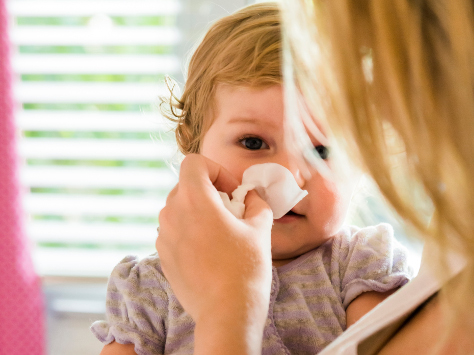Congestion in babies
The main reason babies may get a stuffy nose is hen they have a cold or other viral illness.
However, allergies, dry air and dust can also cause congestion.

What are the symptoms of Congestion in babies?
We all know it feels to be congested so it’s easy to imagine what your baby is going through when it comes to this.
Although they’ll probably be less whingey than a daddy with the dreaded ‘man flu’, bunged-up babies (large and small) find it hard to eat, breathe and sleep. You may also notice they are chesty with the mucus sometimes travelling from their nasal passage to their lungs. Although this symptom is normal and can go hand in hand with nasal congestion, those in the medical world always recommend you see a doctor to rule out any infections.
What are the treatments and remedies of Congestion in babies?
Babies are too small to know that they can breathe through their mouths and blow their noses.
Running a hot shower and sitting in the steamy bathroom with your little one can help to unclog your baby’s nose. Saline nose drops are also another way to loosen dried nasal secretions. Drops can sometimes be hard to place into your baby's nose, so look for a spray which makes things easier.
Another way to help with this is to invest in a nasal bulb syringe to help clear out secretions or opt for vaporiser drops, which can be put onto a handkerchief and placed out of reach near to your baby as they sleep.
If you feel uncomfortable using nasal drops, then another way to help open your baby's nasal passages is through a room vaporiser. Plug this into an electrical socket and it will fill the room with softly soothing vapours that not only help unclog your little one’s nose but also create a relaxing night time environment, though check the label or with the pharmacist if you baby is old enough for this as they may have an age range.
If you’re little one is still suffering then try keeping them upright during the day when they are awake, which could help ease the stuffiness. However, although it may be tempting, never leave them in a carseat or proped up in any other chair to sleep overnight.
This guide
The information in this Bounty A-Z of Family Health is not a substitute for an examination, diagnosis or treatment by a doctor, midwife, health visitor or any other qualified health professional. If in doubt, always speak to a doctor.
Bounty will not be held responsible or liable for any injury, loss, damage, or illness, however this occurs or appears, after using the information given on this website and in particular the A-Z of Family Health.
Further help
For health advice and information 24 hours a day, 365 days a year, the NHS offers call and web services. You can also visit NHS websites for services, health information and health news at nhs.uk
- England – call 111 from any landline or mobile phone free of charge, or visit nhs.uk
- Scotland – call 111 from any landline or mobile phone free of charge, or visit nhs24.com
- Wales – call 0845 4647 , or visit nhsdirect.wales.nhs.uk
- Northern Ireland – visit hscni.net